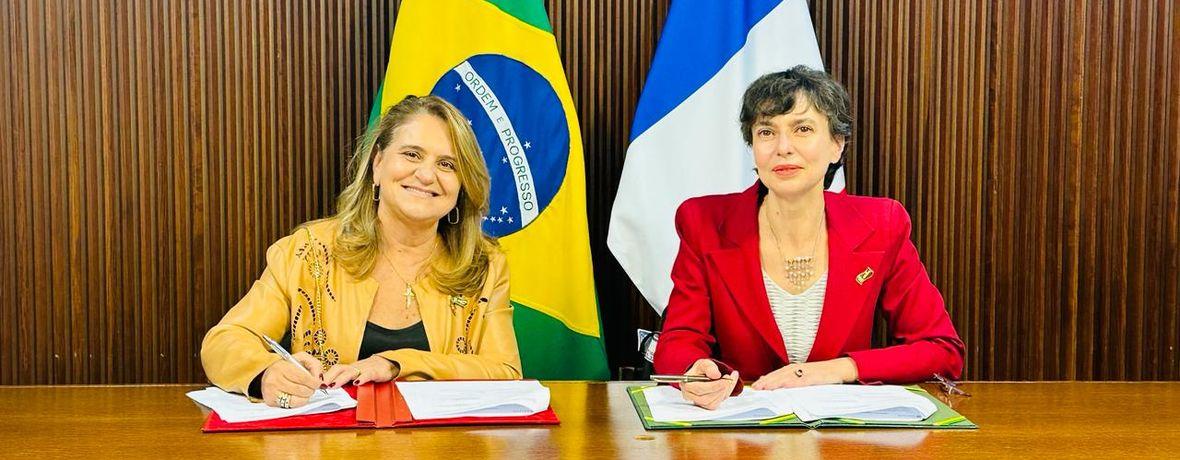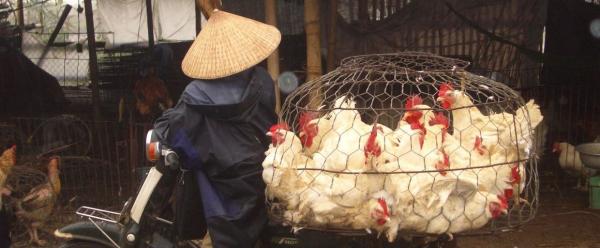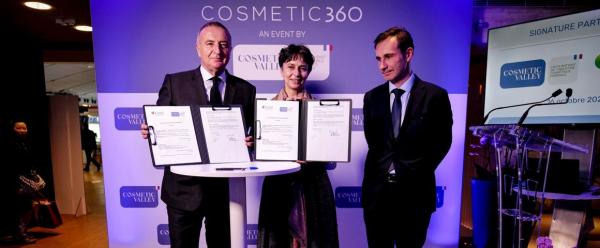Institutional news 21 January 2026
- Home
- Press area
- Press releases
- CIRAD EMBRAPA partnership
CIRAD and EMBRAPA have signed a new agreement building on more than 40 years of partnership

EMBRAPA President Silvia Massruhá and CIRAD CEO Elisabeth Claverie de Saint Martin © EMBRAPA
France is Brazil's second largest scientific partner in the field of agricultural research, just after the US, and EMBRAPA, the Brazilian Agricultural Research Corporation, is also one of CIRAD's main co-publishers. CIRAD, which is celebrating its 40th anniversary this year, and USDA are EMBRAPA's leading international partners.
"Globalization poses major challenges for research, notably in fields like sustainable production, productive inclusion, carbon footprint reduction, digital farming, genetic improvement, restoration of degrade zones, adaptation to climate change, food security, and hunger and poverty alleviation", says EMBRAPA President Silvia Massruhá. At the signing of the new agreement, she stressed the importance of the results produced by the partnership, which she said "has already made significant contributions to public policy and to... scientific diplomacy... Joint projects will almost certainly allow us to make progress on the conservation and sustainable use of the Amazon rainforest in both Brazil and French Guiana".
For CIRAD CEO Elisabeth Claverie de Saint Martin, the signing of the agreement with EMBRAPA will allow the two organizations to contribute to addressing a range of shared challenges. "In the light of the projects that are nearing completion, our collaboration could focus more on protecting and rehabilitating soil fertility", she said. "Natural resource management could be another priority, particularly characterizing and promoting biodiversity within the bioeconomy", she added, also stressing that preserving natural resources such as forests and water in northern Brazil and Nordeste was also a concern shared by the two countries.
According to her, alleviating poverty and food insecurity, particularly in Nordeste, which is also a G20 goal, is another shared challenge, to be addressed by intensifying family farming systems in an agroecological way. "Lastly, promotion of local foods and knowledge could also be stepped up", she concluded.
The memorandum of understanding specifies that the two organizations will base their cooperation on:
- joint planning and implementation of research projects,
- exchanges and reception of researchers and technicians for programme operations,
- technical training and research missions,
- training for researchers and technicians, and hosting of interns, study missions and staff training missions,
- scientific and technical information sharing, with the joint organization of seminars, symposiums and conferences, and joint publications,
- participation in national, regional and international invitations to tender and seeking national and international funding,
- transfers and exchanges of scientific material and equipment, plus genetic resources, for research or information purposes.
The history of the partnership between EMBRAPA and CIRAD
The relationship between EMBRAPA and CIRAD dates back to 1975, before CIRAD was officially founded. Their partnership was built on shared interests and objectives in terms of developing agricultural research and promoting sustainable agriculture in various world regions. The main examples of the two organizations' work together include research projects on cassava, fruit crops, coffee and cocoa, exchanges of researchers and technicians, biotechnology partners, precision farming and climate change projects, plus their joint participation in international research and development networks.
EMBRAPA and CIRAD are currently working together on projects focusing on food security, sustainable agriculture and rural development, the creation of more parasite- and disease-resistant plant varieties, the introduction of more sustainable farming practices to preserve the environment, and promotion of family farming and rural development.
Between 2002 and 2022 alone, EMBRAPA worked with France on almost 1000 scientific publications, putting France second among the countries with which it publishes the most, after the US . France alone accounts for some 30% of all EMBRAPA publications with European institutions. Of the more than 1000 publications with French institutions, 543 involved CIRAD.
In terms of South-South support, the partnership between EMBRAPA and CIRAD could facilitate the sharing of knowledge and expertise in terms of research and agricultural technology development for tropical climates, while CIRAD can offer its experience of agroecology, rural development, and sustainable production systems. This partnership has potential for capacity building, technology transfer, research cooperation and building public policy in favour of agricultural development, productivity improvements, food security, income generation and improved living conditions in the least advanced countries.
This institutional event comes under the banner of CIRAD's 40th anniversary celebrations #CIRAD40



























